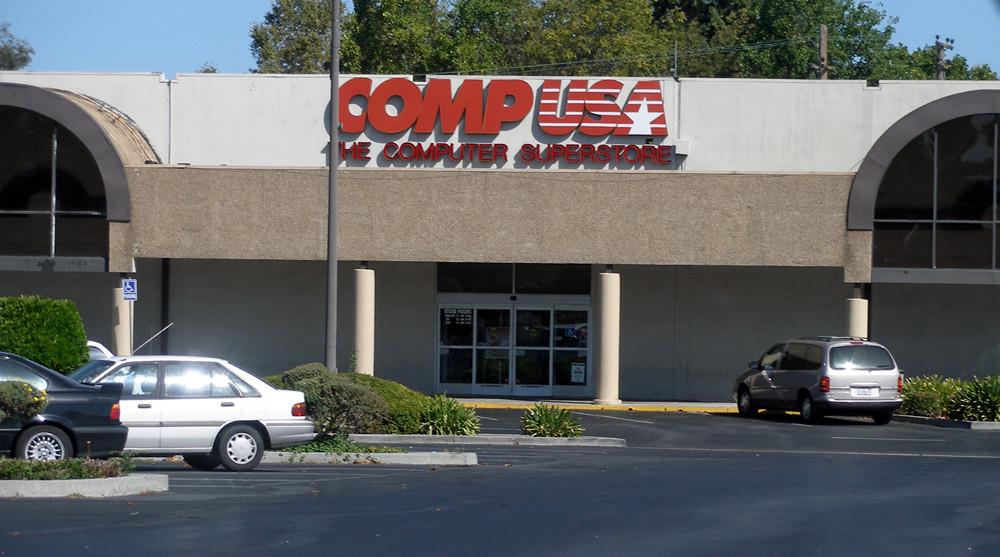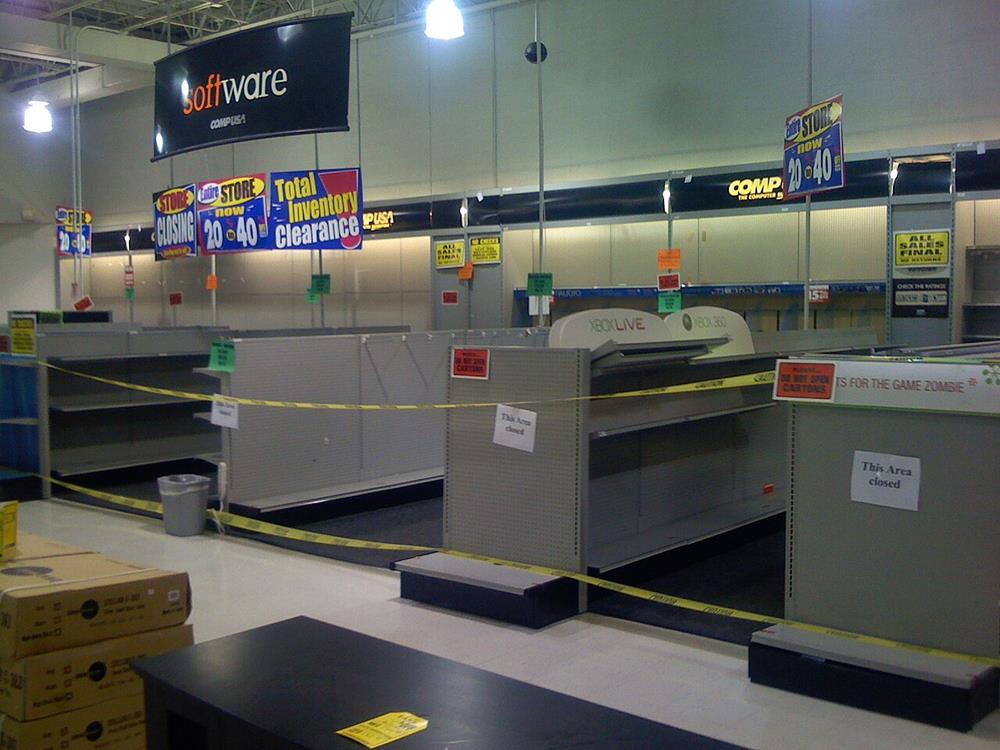CompUSA began in 1984 as Soft Warehouse in Dallas, transforming from a software distributor into a revolutionary “computer supermarket” concept. You’d find unmatched selection and competitive pricing at their stores, which expanded nationwide after going public and acquiring Computer City in 1998.
At its peak, CompUSA operated nearly 230 locations with $5 billion in revenue. This Texas-born retailer dominated the tech landscape before e-commerce changed everything.
The Birth of Soft Warehouse in Dallas
Before becoming a national household name, CompUSA began its journey as Soft Warehouse in 1984 in the Dallas suburb of Addison. Founded with a revolutionary concept for its time, the company aimed to create a “computer supermarket” where customers could find a vast array of computers and accessories at prices considerably lower than specialty PC shops.
The Addison-based retailer quickly distinguished itself in the Dallas tech scene by addressing a widespread issue: the high markup on computer products at specialty stores. Soft Warehouse’s business model was straightforward yet effective—provide greater selection at lower prices.
Much like businesses in the Permian Basin region of West Texas, the company’s solution to market inefficiencies proved successful enough to fuel expansion beyond Dallas within just four years, laying the groundwork for a national retail powerhouse.
From Software Distributor to Computer Supermarket
The transformation of Soft Warehouse from a B2B distributor into America’s leading consumer tech retailer marked a pivotal shift in how the public accessed personal computers. When private investment firm Dubin Clark acquired the company in 1989, they accelerated an expansion strategy that redefined how Americans shopped for computers.
You would’ve witnessed Soft Warehouse’s evolution into the “computer supermarket”—vast stores offering everything from hardware to software under one roof. This Texas-born retailer, rebranded as CompUSA, grew to over 100 superstores by the mid-1990s, generating an impressive $5 billion in annual sales.
Their approach democratized personal computing by allowing consumers—not just tech professionals—to access complete product lines at fair prices.
Rebranding and National Expansion
Three pivotal decisions in the early 1990s reshaped Soft Warehouse into a nationwide tech brand.
First, the company rebranded as CompUSA and went public in 1991, raising capital for expansion.
Second, it acquired Computer City—a key competitor owned by Tandy Corporation—in 1998, solidifying its dominance.
Third, it doubled down on big-box retail stores, creating immersive shopping spaces unlike anything in the tech market at the time.
The Golden Era: CompUSA’s Market Dominance

After rebranding and expanding, CompUSA entered what analysts call its golden era. By the mid-to-late 1990s, this big-box tech giant operated nearly 230 locations and generated over $5 billion in revenue.
You’d find CompUSA’s success driven by:
- Competitive pricing over boutique PC stores
- Unmatched variety in computers, software, and accessories
- A retail format that catered to both tech novices and hobbyists
Its flagship Houston store, with mirrored glass architecture, became a symbol of its dominance. CompUSA’s growth paralleled the rise of Austin’s “Silicon Hills”, where tech firms were expanding rapidly throughout the 1990s.
The Houston Connection: A Texas Success Story
While Addison was the company’s birthplace, Houston became a key market that solidified CompUSA’s brand visibility. When the Pavilions Shopping Center store opened in 1989, it gained a local edge before Best Buy, Circuit City, and Computer City ramped up their Texas expansion.
The Westheimer and Kirkwood stores became legends inside the company, even surviving challenges like a $100,000 theft at the Westheimer location.
Even after CompUSA debuted on the New York Stock Exchange, its Houston presence anchored its core identity—particularly with a heavy focus on PC-compatible products that dominated the local and regional markets.
Challenges in the Evolving Retail Landscape

Why did a tech retail giant with hundreds of stores suddenly collapse? The rise of online shopping radically changed consumer habits. Although CompUSA.com launched in 1996, the brand struggled to compete with the ease and pricing of emerging online competitors like Amazon and Newegg.
Shoppers shifted to digital platforms where they could compare prices, read reviews, and enjoy home delivery. CompUSA failed to adapt quickly to these preferences, and its large physical stores became costly liabilities.
Despite efforts to modernize, CompUSA’s brick-and-mortar model became outdated, and its failure to fully embrace e-commerce marked the beginning of its decline.
The Grupo Sanborns Acquisition and Aftermath
As CompUSA floundered, a major ownership change reshaped its future. In 2000, Grupo Sanborns, owned by Mexican billionaire Carlos Slim, acquired 85% of CompUSA and shifted its focus strictly to retail, discontinuing integration services.
Industry insiders speculated about Slim’s intent, with some alleging the move was meant to reduce competition in Mexico—a claim ultimately dismissed, though it led to legal tensions and a multi-million-dollar settlement.
Under new ownership, internal restructuring and “weird changes” unsettled operations. The once-iconic stores now struggled to stay profitable, and the company began shuttering dozens of underperforming locations.
Legacy and Resurrection: CompUSA in the Digital Age
While Circuit City vanished entirely, CompUSA managed a partial comeback. In 2008, Systemax Inc. (owner of TigerDirect) acquired the CompUSA brand and a handful of stores for $30 million.
Later, in 2012, the remaining stores were folded into TigerDirect, effectively retiring the brand again.
But in 2018, DealCentral LLC relaunched CompUSA as a coupon aggregator website, relying on brand nostalgia to drive traffic. Though the modern version lacks the innovation of its brick-and-mortar predecessor, the CompUSA name lives on—albeit as a discount affiliate site, no longer a tech retail trailblazer.


